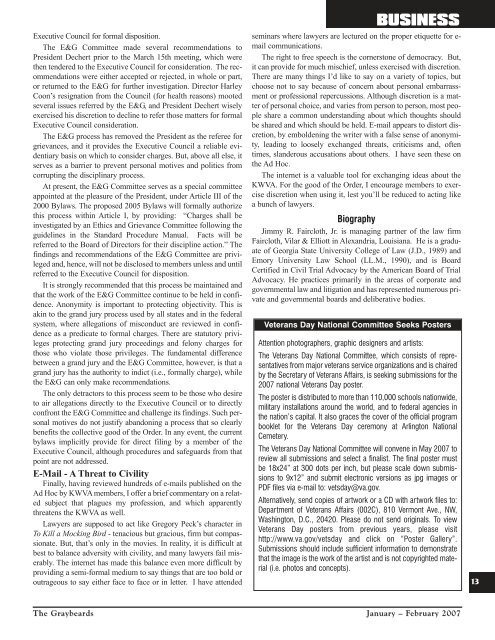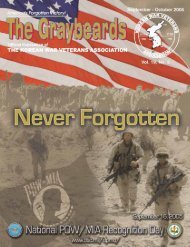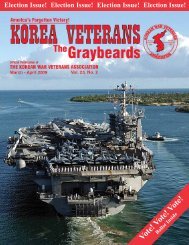THE PUNCHBOWL December 15, 2006 - Korean War Veterans ...
THE PUNCHBOWL December 15, 2006 - Korean War Veterans ...
THE PUNCHBOWL December 15, 2006 - Korean War Veterans ...
You also want an ePaper? Increase the reach of your titles
YUMPU automatically turns print PDFs into web optimized ePapers that Google loves.
Executive Council for formal disposition.<br />
The E&G Committee made several recommendations to<br />
President Dechert prior to the March <strong>15</strong>th meeting, which were<br />
then tendered to the Executive Council for consideration. The recommendations<br />
were either accepted or rejected, in whole or part,<br />
or returned to the E&G for further investigation. Director Harley<br />
Coon’s resignation from the Council (for health reasons) mooted<br />
several issues referred by the E&G, and President Dechert wisely<br />
exercised his discretion to decline to refer those matters for formal<br />
Executive Council consideration.<br />
The E&G process has removed the President as the referee for<br />
grievances, and it provides the Executive Council a reliable evidentiary<br />
basis on which to consider charges. But, above all else, it<br />
serves as a barrier to prevent personal motives and politics from<br />
corrupting the disciplinary process.<br />
At present, the E&G Committee serves as a special committee<br />
appointed at the pleasure of the President, under Article III of the<br />
2000 Bylaws. The proposed 2005 Bylaws will formally authorize<br />
this process within Article I, by providing: “Charges shall be<br />
investigated by an Ethics and Grievance Committee following the<br />
guidelines in the Standard Procedure Manual. Facts will be<br />
referred to the Board of Directors for their discipline action.” The<br />
findings and recommendations of the E&G Committee are privileged<br />
and, hence, will not be disclosed to members unless and until<br />
referred to the Executive Council for disposition.<br />
It is strongly recommended that this process be maintained and<br />
that the work of the E&G Committee continue to be held in confidence.<br />
Anonymity is important to protecting objectivity. This is<br />
akin to the grand jury process used by all states and in the federal<br />
system, where allegations of misconduct are reviewed in confidence<br />
as a predicate to formal charges. There are statutory privileges<br />
protecting grand jury proceedings and felony charges for<br />
those who violate those privileges. The fundamental difference<br />
between a grand jury and the E&G Committee, however, is that a<br />
grand jury has the authority to indict (i.e., formally charge), while<br />
the E&G can only make recommendations.<br />
The only detractors to this process seem to be those who desire<br />
to air allegations directly to the Executive Council or to directly<br />
confront the E&G Committee and challenge its findings. Such personal<br />
motives do not justify abandoning a process that so clearly<br />
benefits the collective good of the Order. In any event, the current<br />
bylaws implicitly provide for direct filing by a member of the<br />
Executive Council, although procedures and safeguards from that<br />
point are not addressed.<br />
E-Mail - A Threat to Civility<br />
Finally, having reviewed hundreds of e-mails published on the<br />
Ad Hoc by KWVA members, I offer a brief commentary on a related<br />
subject that plagues my profession, and which apparently<br />
threatens the KWVA as well.<br />
Lawyers are supposed to act like Gregory Peck’s character in<br />
To Kill a Mocking Bird - tenacious but gracious, firm but compassionate.<br />
But, that’s only in the movies. In reality, it is difficult at<br />
best to balance adversity with civility, and many lawyers fail miserably.<br />
The internet has made this balance even more difficult by<br />
providing a semi-formal medium to say things that are too bold or<br />
outrageous to say either face to face or in letter. I have attended<br />
BUSINESS<br />
seminars where lawyers are lectured on the proper etiquette for e-<br />
mail communications.<br />
The right to free speech is the cornerstone of democracy. But,<br />
it can provide for much mischief, unless exercised with discretion.<br />
There are many things I’d like to say on a variety of topics, but<br />
choose not to say because of concern about personal embarrassment<br />
or professional repercussions. Although discretion is a matter<br />
of personal choice, and varies from person to person, most people<br />
share a common understanding about which thoughts should<br />
be shared and which should be held. E-mail appears to distort discretion,<br />
by emboldening the writer with a false sense of anonymity,<br />
leading to loosely exchanged threats, criticisms and, often<br />
times, slanderous accusations about others. I have seen these on<br />
the Ad Hoc.<br />
The internet is a valuable tool for exchanging ideas about the<br />
KWVA. For the good of the Order, I encourage members to exercise<br />
discretion when using it, lest you’ll be reduced to acting like<br />
a bunch of lawyers.<br />
Biography<br />
Jimmy R. Faircloth, Jr. is managing partner of the law firm<br />
Faircloth, Vilar & Elliott in Alexandria, Louisiana. He is a graduate<br />
of Georgia State University College of Law (J.D., 1989) and<br />
Emory University Law School (LL.M., 1990), and is Board<br />
Certified in Civil Trial Advocacy by the American Board of Trial<br />
Advocacy. He practices primarily in the areas of corporate and<br />
governmental law and litigation and has represented numerous private<br />
and governmental boards and deliberative bodies.<br />
<strong>Veterans</strong> Day National Committee Seeks Posters<br />
Attention photographers, graphic designers and artists:<br />
The <strong>Veterans</strong> Day National Committee, which consists of representatives<br />
from major veterans service organizations and is chaired<br />
by the Secretary of <strong>Veterans</strong> Affairs, is seeking submissions for the<br />
2007 national <strong>Veterans</strong> Day poster.<br />
The poster is distributed to more than 110,000 schools nationwide,<br />
military installations around the world, and to federal agencies in<br />
the nation’s capital. It also graces the cover of the official program<br />
booklet for the <strong>Veterans</strong> Day ceremony at Arlington National<br />
Cemetery.<br />
The <strong>Veterans</strong> Day National Committee will convene in May 2007 to<br />
review all submissions and select a finalist. The final poster must<br />
be 18x24” at 300 dots per inch, but please scale down submissions<br />
to 9x12” and submit electronic versions as jpg images or<br />
PDF files via e-mail to: vetsday@va.gov.<br />
Alternatively, send copies of artwork or a CD with artwork files to:<br />
Department of <strong>Veterans</strong> Affairs (002C), 810 Vermont Ave., NW,<br />
Washington, D.C., 20420. Please do not send originals. To view<br />
<strong>Veterans</strong> Day posters from previous years, please visit<br />
http://www.va.gov/vetsday and click on “Poster Gallery”.<br />
Submissions should include sufficient information to demonstrate<br />
that the image is the work of the artist and is not copyrighted material<br />
(i.e. photos and concepts).<br />
13<br />
The Graybeards January – February 2007

















